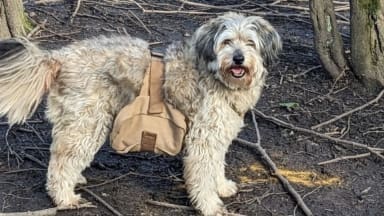
Mimicking the role wolves once played in wildflower seed dispersal, dogs are adorned with special backpacks with tiny holes that release seeds as they explore the Railway Land Local Nature Reserve. This method allows for wider seed distribution and potentially more effective germination because dogs can cover at least four times the distance that a human does and are able to visit areas of the nature reserve which are harder to reach.
The 25 acre Railway Land Local Nature Reserve is managed by the Railway Land Wildlife Trust and the Lewes District Council. The reserve, nestled on the River Ouse flood plain, was once a busy railway marshalling yard but now boasts varying water habitats bursting with a variety of wildlife.
Not all dogs make the cut to be a wolf-seeder, as the trial included carefully selected pooches, all of which operated in monitored areas with locally collected native seed. The project has proved a great way to positively engage with dog walkers, which can sometimes be problematic for parks and nature reserves.
“We’ve already started to see seed germination in some areas, but most of the seeds that have been distributed by the dogs are perennials, which take a couple of years to establish and flower so hopefully next year we’ll see some clearer results”, explained Dylan Walker, the project manager.
According to the Railway Land Wildlife Trust, germination has begun and they plan to do more wolf-seeding rewilding in the autumn. To date, germination rates are reportedly not very high, but the Trust admits that it might take a few seasons to see positive change.

